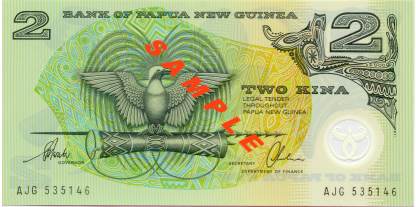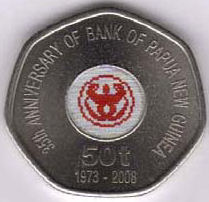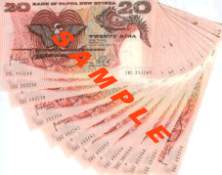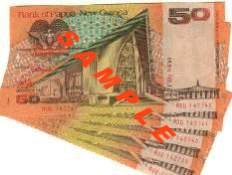|
The Kina was so named because in Tok Pisin (neo-melanesian) and in the Kuanua language it referred to the valuable pearl shell used widely in the Highlands as traditional money. Toea, is a Motu word, meaning valuable arm-shell and has had a wide traditional use in coastal Papua for trading and brideprice payments.
During the colonial period and before the introduction of the Kina and Toea, the people of PNG used German Marks and Pfennings, Japanese Yen, Australian Pounds, Shillings and Pence and most recently up until the 19th of April 1975 Australian Dollars and cents.
On the 19th of April 1975 only the coins 1t, 2t, 5t, 10t, 20t and K1.00 were minted and the K2, K5 and K10 bank notes The K20 bank note was introduced in 1978, the K50 bank note in 1989 and in November 2005 the Bank of PNG introduced a K100 note. The 50 toea coin was introduced in 1980 for the 3rd South Pacific Festival of Arts held in Port Moresby. The 1 and 2 toea were minted in bronze, with the others in cupronickel.
Today the PNG currency consists of the following notes and coins in daily use with the 1 and 2 toea coins phased out in 2007. The 1 and 2 toea coins are increasingly harder to find as 99.99% have been returned to the bank and are no longer legal tender.
To celebrate events happening in 2015 the Bank of PNG released several bank notes and coins.- K10 - K20 and 50t .. The banknotes and new 50 toea coin are legal tender as of 21 May 2015. |
Exchange Rates
K2 Note
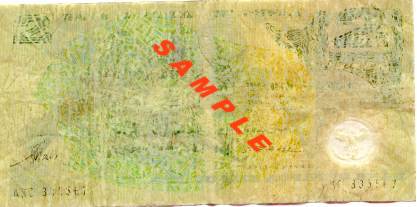
This is a worn K2 polymer note still in daily circulationThe K2 note is made from a plastic polymer and it eventually rots away like an old plastic bag. It is made by the Royal Australian Mint using the same process as the Australian Dollar notes. Here is a web site that deals with polymer notes -- http://www.polymernotes.org/country_pages/png.htm
This one is in good conditionCOINS: K1, 50t, 20t, 10t, 5t, (2t and 1t - being phased out)
The One Kina coin has a hole in the middle. Unlike some other countries the single Kina has always been a coin and not a bank note Up until November 2005 the K1 coin measures 32.72 mm with central hole of 6.9 mm It now measures 30 mm The dimensions of the other coins are :
Features (back)
IssueBirdwing Butterfly (Ornithoptera Paradis) Butterfly Cod (Pterois Volitans) Turtle (Carettochelys) Turtle (Carettochelys) Cuscus (Phalanger maculatus) Cuscus (Phalanger maculatus) Cassowary (Casuarius Bennetti) Cassowary (Casuarius Bennetti)
1991
19981980 4th South Pacific Festival of Arts
1991 9th South Pacific Games
1998 Bank of PNG Silver Jubilee23 Jun 2008 -- 50th Anniversary of the establishment of the Saint John Ambulance Services 2008 - Commemorative coin with coloured BPNG Logo using Royal Canadian Mint technology. Saltwater & freshwater crocodiles Withdrawn on the 31st of December 2008.
2005Saltwater & freshwater crocodiles (6 mm hole in middle)
Saltwater (Crocodile Pororus) left hand side
Freshwater (Crocodile Novaequineae) right hand sideSaltwater & freshwater crocodiles (6 mm hole in middle)
launched November 2005
Saltwater (Crocodile Pororus)
Freshwater (Crocodile Novaequineae)Commemorative K5 and K10 mint coins have been produced and a Gold K100 coin exists but they are not in daily use. The fifty toea piece is also used on commemorative occasions and is used for normal street circulation. The bank notes, like the coins, feature the Papua New Guinea Crest or National Emblem.
Size Colour Material Introduced K 2.00 70 x 140 mm
75 x 149.5 mmDark Green on light green originally paper
Now polymerApril 1975 K 5.00 73 x 145 mm
72.5 x 145 mmDark violet and multicolour April 1975 K10.00 76 x 150.5
72.5 x 145 mmblue and multicolour April 1975 K20.00 75 x 150 mm Red and multicolour Paper K50.00 75.5 x 151 mm Orange background originally paper
Now polymerK100.00 75mm x 150mm Polymer made by Note Printing Australia, a subsidiary of the Central Bank of Australia K100 75mm x 150mm Commemorative Note There are still traditional forms of money being used in PNG even today. One example is the Tabu Shell Money from East New Britain Province another is the Bagi from Milne Bay Province.
The K50 and K20 notes are displayed below
The first PNG polymer note was introduced in 1991).
Papua New Guinea introduced a polymer K50 note on the 16 June 1999. The K100 polymer note was introduced in November 2005
Fifty Kina notes (K50.00 pre-polymer)
If you want to know more about the currency of PNG the best site to visit is the Bank of PNG.
PNG Notes are made in a similar fashion to the video clip.
[ K100.00 | K50.00 | K20.00 | K10.00 | K5.00 | PNG Tabu | PNG Bagi | PNG Doba ]
[ Home | PNG Index | PNG Links | PNG Web Ring | PNG Gossip | Family Index | Site Info ]
